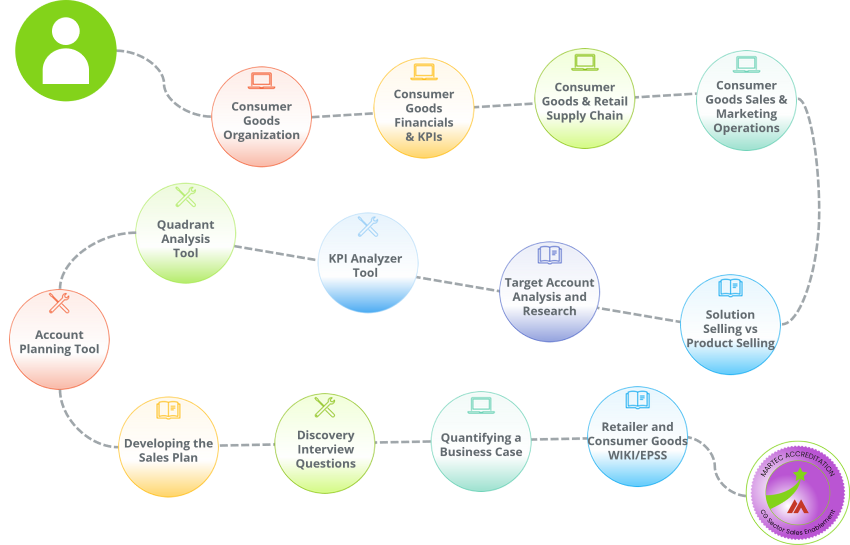Consumer Goods Sector Sales Enablement
Consumer Goods Sales Enablement Learning Path
This learning path is for people in a sales enablement role. In these roles they have to design, teach and coach those in sales roles, so they need a deeper level of knowledge to accomplish this, commensurate with the knowledge levels of experienced pre-sales support people. This learning path builds on the Induction learning path.
Select any of the circles along the path to find out more about each step.

The Skills You Will Learn
By studying this learning path, consultants will gain these skills:
- Review typical consumer goods company organization structures, identify the key functional departments and the relevant executives and identify their pain points.
- Describe the complete consumer goods supply chain, the role each party plays and list the key supply chain challenges companies often face. Match a target account against its position in the chain to identify possible opportunities.
- Recognize the role that retailers, wholesalers, brokers and other play and some of their challenges and associated trends.
- Describe the main retail processes that consumer goods companies have to interface into to provide a deeper understanding of their customers including buying and merchandising, and how to dovetail into them.
- Research the organization of a consumer goods company account and identify the key executive functions, their responsibilities and pain points.
- Perform desk research and target account analysis, including financials and KPIs, identify further challenges, prioritize those that they can address, and identify potential solutions.
- Review the CG sales and marketing organization for potential further areas of performance improvement.
- Carry out a quadrant analysis to match the account’s IT applications architecture against industry best practice to identify potentially missing applications that can deliver benefits.
- Identify appropriate solutions with the necessary detail to make a persuasive case.
- Develop a sales plan for the account to confirm whether suspect opportunities are real ones, plan approaches to the relevant executives for those opportunities, start initiatives to get meetings, and in conjunction with pre-sales support, create a list of meeting discovery questions for each potential opportunity.
- Identify the quantifiable benefit areas for each opportunity, the likely costs of delivery and implementation and prepare a draft return on investment case, to be further developed as the sale progresses.
- Plan a negotiating strategy with the account when the sales activities have proceeded far enough.
